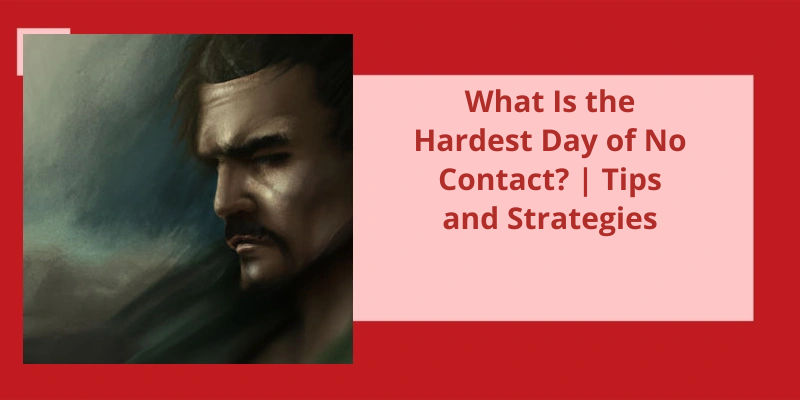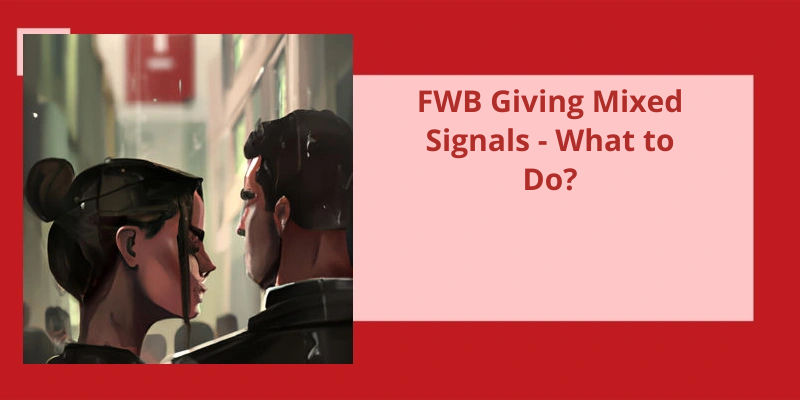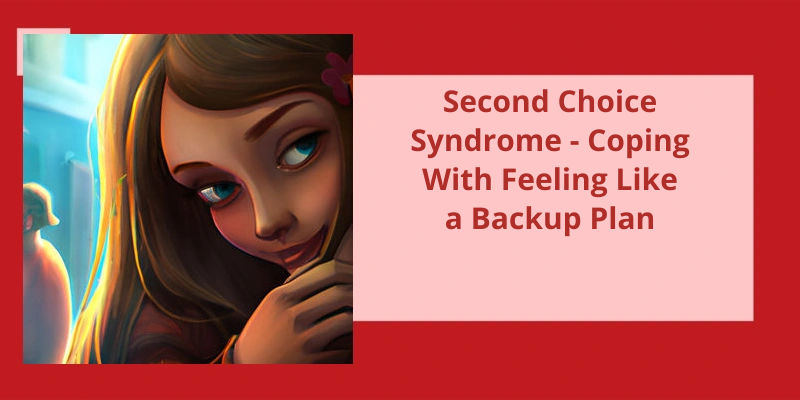What Week of No Contact Is the Hardest?
The concept of no contact is a well-known strategy for those who’re dealing with a break-up. The idea is that you cut off all communication with your ex-partner for a certain amount of time, usually around 30 days. The theory behind this strategy is that it gives you time and space to heal and move on from the relationship.
One of the reasons why the first week of no contact is so difficult is that you’re still in the withdrawal phase. Just like any addiction, a relationship can make you feel good, and when it’s taken away, you can experience symptoms of withdrawal. This can include anxiety, depression, and physical symptoms like headaches and stomach aches.
Another reason why the first week of no contact is so hard is that you’re breaking a habit. Most likely, you and your ex had a routine, a pattern of communication that you were used to. Suddenly cutting off all communication can leave you feeling disoriented and unsure of what to do with your time or how to fill the void that your ex used to occupy.
You’ve to resist the urge to contact your ex and instead focus on self-care and healing. This can be especially challenging if you’re feeling particularly vulnerable or lonely.
While no contact is a sound strategy for moving on from a relationship, the first week of implementing it’s often the most challenging. This is because it involves dealing with withdrawal symptoms, emotional attachment, breaking habits, and summoning willpower and discipline. It’s important to remember that these feelings are normal, and that with time and dedication, you can heal and come out stronger on the other side.
When it comes to the no contact rule, determining the appropriate amount of time can be a bit tricky. While there are general guidelines that suggest a duration of 10-14 days is appropriate in most cases, ultimately it’s up to individual discretion. Some may feel that extending the no contact period up to 21 days is more effective, while others may find that a shorter timeframe works best. Regardless of the length you choose, consistency is key.
Is 10 Days No Contact Enough?
The no contact rule is a popular strategy used by many people in the aftermath of a breakup. It involves avoiding all contact with an ex-partner for a set period of time. The idea behind this is to give both parties space and time to heal and move on from the relationship. But how long should this no contact phase last?
For most situations, 10-14 days makes for a healthy duration for the no contact phase. This timeframe allows for enough space and distance from the relationship without it being too long that you risk losing touch with your ex. It gives both parties time to reflect on what went wrong, take care of themselves, and focus on their own lives.
However, every situation is unique and some may require a longer or shorter no contact period. If you feel like a bit longer than 14 days would be better for you personally, then go ahead and choose a duration that you feel comfortable with. Anything up to 21 days will be fine and can be beneficial in helping you gain clarity about the situation.
It’s important to stick to the set timeframe of the no contact period once youve chosen it. This means no texting, calling, or any other form of communication with your ex during this time. It’s also important to avoid stalking their social media pages as this can keep you stuck in the past and prevent you from moving forward. Fill your schedule with activities that make you happy and invest in self-care during this time. Focus on bettering yourself and your life, rather than dwelling on the past.
While the no contact rule can be a helpful way to move on from a breakup, it’s not a magic solution for all relationship problems. It’s important to consider the unique circumstances of your situation and whether a no contact period is right for you. In some cases, staying in touch with your ex may be necessary for practical reasons such as shared children or financial matters. In these cases, communication can be kept to a minimum and only related to the necessary matters at hand.
How to Determine if a Longer or Shorter No Contact Period Is Needed for Your Situation.
When deciding whether a longer or shorter no contact period is needed for your situation, consider the severity of the situation and how much time you both may need to heal and move on. If the situation was particularly traumatic or emotional, a longer period may be necessary, while a shorter period may suffice for less intense situations. It’s important to assess your individual needs and prioritize self-care during this time.
Source: I’m in no contact with my ex-girlfriend for 10 days. Will she …
During the 21-day no contact period, our minds and emotions may go through various ups and downs. Some may feel a sense of relief from finally having some space, while others may struggle with the urge to reach out to their ex-partner. However, the purpose of this rule is to give ourselves a much-needed break from the situation and allow us to detoxify our minds and emotions from any negativity or unhealthy patterns that may have developed during the relationship.
What Is Day 21 of No Contact Rule?
During this time, we try to move on with our lives and find ourselves without the constant presence of the person who’s hurt us. For some people, it’s a way of taking control of their own emotions and finding peace within themselves. It can be a great catharsis for some and allows them to take a step back and assess their relationships without the other person influencing their decisions.
Day 21 of the no contact rule is often a much-anticipated milestone for those who’ve decided to implement it. By this time, a lot of the initial shock and hurt may have subsided, and people may be feeling more level-headed and more detached from their emotions. However, this doesn’t mean that they won’t feel some anxiety or nervousness when the day approaches. After all, this is the day where they may finally hear from their ex, or they may decide to reach out to them themselves.
One common question people have about day 21 is whether they should break the no contact rule if their ex doesn’t reach out to them first. The answer to this is highly subjective and dependent on the individual situation. For many people, waiting for their ex to contact them is a way of testing their interest in the relationship. However, there’s no right or wrong answer to this question, and it ultimately comes down to personal choice.
However, it’s important to approach this milestone with an open mind and a clear head. Whether you decide to wait for your ex to reach out or take the first step yourself, remember that communication is key. Take this time to focus on yourself and your personal growth, and you may find that your relationship with your ex can be stronger and healthier than ever before.
Signs That It May Be Time to Break the No Contact Rule
- You constantly check their social media profiles
- You frequently think about contacting them
- You feel anxious or upset when you see or hear about them with someone else
- You haven’t made progress in moving on since implementing the no contact rule
- You feel as though you made a mistake by implementing the no contact rule in the first place
- You’ve unresolved feelings or issues that you feel can only be addressed by breaking the no contact rule
- You feel as though you’re missing out on important events or milestones in their life
- You receive signs or signals that they may also be interested in breaking the no contact rule
It’s a common question after a breakup: how long should you go without contact with your ex? While there’s no one-size-fits-all answer, many experts suggest that a week of no contact is often enough to start feeling better and gain some perspective. However, there are some instances where a longer no contact period may be necessary to allow for emotions to dissipate and healing to begin. In this article, we’ll explore the benefits and drawbacks of a week of no contact, as well as the situations where longer periods may be warranted.
Is 1 Week Enough for No Contact?
However, in most cases, one week of no contact is enough to give both parties a chance to clear their heads and assess the situation. This time apart allows for emotions to settle and for each person to gain some perspective on the relationship. It also allows for any hurt or anger to subside so that communication can be more productive in the future.
One week of no contact can also give both parties time to work on themselves and focus on personal growth. It can be difficult to move on and heal from a breakup when constant contact and reminders of the past are present. Taking a break from communication can allow each person to focus on their own needs and work towards becoming the best version of themselves.
For some, one week of no contact may seem like an eternity. However, it’s important to remember that healing takes time and there’s no timeline for getting over a breakup. It’s important to be patient with yourself and not rush the healing process. Take the time you need to process your emotions and work towards building a better future for yourself.
It’s also important to note that no contact doesn’t necessarily mean a permanent end to the relationship. In some cases, it may be necessary to take a break from communication in order to work on personal issues or to address any underlying problems in the relationship. However, with time and effort, communication can be reestablished and a healthy, happy relationship can be built.
Conclusion
In conclusion, there’s no denying that no contact is a challenging and emotional journey. Each stage of the process brings it’s own difficulties, but the hardest day is undoubtedly the very first day. It's the day when the reality of the situation sets in, and you must face the prospect of cutting off all communication with someone you care about deeply. Even limited no contact breaks can be tough, as they signify a temporary loss of contact that can feel like a step backward. However, it's the days when you're not hearing from them at all that are perhaps the most difficult, as you're left to wonder about their whereabouts and whether they're thinking about you. The roller coaster impact of no contact can be particularly challenging, as you oscillate between feelings of hope and despair. But despite the difficulties, no contact is ultimately a transformative process that allows you to heal and move on from a toxic or unhealthy relationship.






